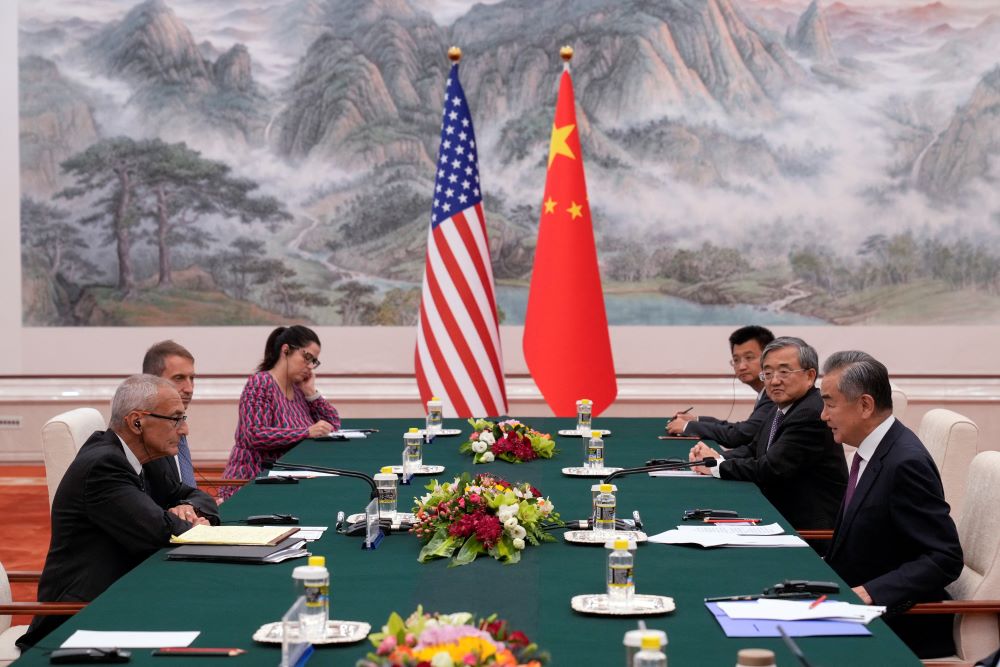Yao Zhe is global policy advisor for Greenpeace East Asia.
John Podesta visited Beijing last week on his first trip to China as US climate envoy. Both countries’ new climate action plans, known as Nationally Determined Contributions (NDCs), were high on his agenda, along with talks on methane, the circular economy and sub-national cooperation.
The discussions on NDCs were relatively low-key, and that appears to be a strategic choice. With constant emphasis that China will take actions “at its own pace”, Beijing is unlikely to play into any “US persuades China” narrative, where China is hit up for political points that land in its competitor’s basket.
Rather than pressuring, engagement with Beijing should be about building a strong case for China’s growing self-interest in raising climate ambition now, based on robust economic, political and social pillars.
Bigger share of COP29 badges for Global South NGOs upsets rich-country groups
Podesta landed in China amid a bit of a climate policy revival. Beijing recently issued measures instructing provinces and industries to use more renewable power and to adopt better carbon accounting and confirmed that China will apply a hard emissions cap by 2030 at the latest.
It’s good news for an international community that had started to worry whether the climate issue was slipping down China’s political agenda. But it’s not clear whether the recent positive signals from Beijing mean that China will necessarily be bolder in setting its new international commitments.
Economic boon
Climate diplomacy is heating up as the deadline for countries to submit 2035 NDCs approaches early next year. American and European climate diplomats are seeking affirmation from China that its new NDC will be ambitious. But China is keeping its cards close to its chest and has so far only confirmed it will deliver its new NDC on time in 2025. In response to its western counterparts, Chinese policymakers still stick to long-standing positions, arguing that they are more focused on implementation than on grand targets that may not be realized in the end.
The obvious constraints to China’s ambition on its new NDC include the domestic economy, where ensuring steady growth remains the primary concern for governments at all levels. As a consequence, reforms that could cause structural changes in industries and jobs have stagnated.
Lessons from trade tensions targeting “overcapacity” in China’s cleantech industry
But for China’s domestic economy, stronger climate action—buoyed by ambitious targets—is unmistakably an economic boon. The cleantech industry is becoming a new economic driver in China. And companies, especially in the solar and EV sectors, are rapidly expanding their manufacturing capacity in anticipation of strong future demand.
While exports of cleantech products keep growing, the size of the domestic market means it will remain the “base” for Chinese companies. Chinese policymakers’ conventional “under-promise, over-deliver” style of target-setting is not enough for the industry. This year, China is already hitting its 2030 target on wind and solar installation. Stronger sectoral targets for the next 5 to 10 years will help expand the domestic market and give the industry and investors the confidence it needs.
Responsible global power
Internationally, China should also see the growing self-interest in setting strong targets and leading global climate action. It’s clear that China wants greater recognition as a responsible global power – and its decision to focus on implementation is a way of differentiating itself from Western powers. But this strategy will not succeed if it ends up presenting a weak target that gives no one aspiration or hope.
By 2035, global emissions need to be reduced by at least 60% from 2019 levels, in order to keep within the 1.5°C warming limit, according to the Intergovernmental Panel on Climate Change. In terms of China’s share, different models suggest a 30%-80% cut of emissions from the peak by 2035 is needed to align with the 1.5C global goal.
Chinese policy makers may argue that modeling is too far from the economic and social realities. But it is exactly because of this gap that countries need ambitious policy targets to alter the curve of business-as-usual. Readjustments can only move us so far from business as usual. Emissions reductions need a well-defined target to orient themselves towards.
Verra axing of Shell’s rice-farming carbon credits in China fuels integrity fears
The possibility of a Trump 2.0 inevitably constrains the potential for climate ambition in many countries. But China is an exception, thanks to its strong cleantech industry. The clean transition of China’s economy is independent of a Trump or Harris victory, so should be China’s international commitment.
China should see the coming months as a window of opportunity to demonstrate its unimpeachable role in international climate politics. When the global process is at risk of losing momentum, a robust new NDC from China would be a shot-in-the-arm.
Fundamentally, tackling climate change is a matter of public health and safety. China has just experienced a summer of historic flooding and weather disruption. In July alone, storms, floods and related disasters affected nearly 23 million people and caused $10 billion in direct economic losses, according to China’s Ministry of Emergency Management.
Economic and political gains aside, there is no stronger evidence than broken families and communities to demand robust action to mitigate climate impacts.
